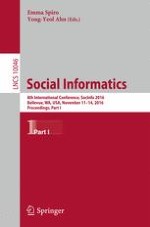2016 | OriginalPaper | Buchkapitel
Lightweight Interactions for Reciprocal Cooperation in a Social Network Game
verfasst von : Masanori Takano, Kazuya Wada, Ichiro Fukuda
Erschienen in: Social Informatics
Aktivieren Sie unsere intelligente Suche, um passende Fachinhalte oder Patente zu finden.
Wählen Sie Textabschnitte aus um mit Künstlicher Intelligenz passenden Patente zu finden. powered by
Markieren Sie Textabschnitte, um KI-gestützt weitere passende Inhalte zu finden. powered by
